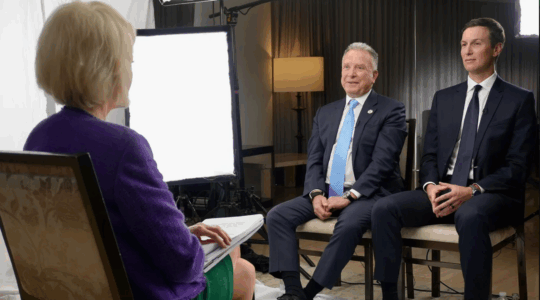(JTA) — Moving Traditions is a small Jewish organization with an unusual name and a mission that can be hard to describe on one foot. Working through synagogues, Hebrew schools and its own programs and curricula, it helps Jewish kids navigate their teen years in healthy, safe, appropriate and socially conscious ways.
When the Hamas attacks in Israel on Oct. 7 threw the Jewish world into crisis, Moving Traditions created curricula to help teachers and teens talk about the conflict. And its CEO, Shuli Karkowsky, ordered up a “worst-case scenario” plan in case some of her reliable funders decided to hold back on their support and direct more money to Israel.
“We need to be humble and realize that we are an organization that serves North American teens. And so I don’t think we can put ourselves out there as the people who are going to be solving the Middle East crisis,” she said earlier this week.
To her relief, at a time when the Jewish philanthropic community is mobilizing around the war, her funders said they are going to “make the pie bigger”— that is, continue supporting groups like hers and expanding their giving in Israel.
As they have during previous crises in Israel, American Jews are pouring dollars into Israel to support people displaced by the war, to bolster nonprofits whose employees are headed to the front and, in a newish twist, to defend both Israel in the court of public opinion and Jews abroad who are seeing an uptick in antisemitism.
Jewish Federations of North America has raised $638 million among its network of local Jewish community chests. UJA-Federation of New York, the largest of these, has so far allocated more than $38 million for work on the ground in Israel. Israel Bonds said it sold more than $200 million worth of bonds in the week following the Hamas attacks.
Jewish nonprofit execs celebrate this outpouring but are quietly anxious. As priorities shift to the defense of and support for Israel, what will happen to the bottom line of the schools, social services agencies, cultural centers and other Jewish institutions that don’t have an obvious Israel portfolio?
An adjacent question is one of discretion, even tact: With many nonprofits dependent on the end-of-the-year gifts that allow donors to claim tax benefits, should they go ahead with their own fundraising appeals and perhaps attach their “asks” to the current crisis?
“What irks me particularly is an emergency campaign now when they’re not related to the crisis,” said Andres Spokoiny, the president and CEO of the Jewish Funders Network, speaking generally. “If you’re a school that is not affected by the crisis, just tell the truth that despite the crisis, you need to continue operating, and that having a strong community means that institutions and organizations like yours need to be strong and healthy.”
Spokoiny, whose organization’s “How You Can Help” Israel page lists “trusted agencies and nonprofits,” has been recommending to the private foundations and philanthropists under his organization’s umbrella that they give “above and beyond,” supporting their traditional grantees as well as the emergency campaigns for Israel. “Otherwise,” he said, “you’re robbing Peter to pay Paul.”

Hundreds gather for a pro-Israel rally in Philadelphia’s Independence Square, sponsored by the Jewish Federation of Greater Philadelphia, Oct. 16, 2023. (Jewish Federation of Greater Philadelphia)
Spokoiny also knows that the pot of funds allocated for Jewish giving is not bottomless. He is hoping the current crisis serves as a “wake-up call to the many Jewish donors that give, you know, token gifts to the Jewish community and huge gifts to their alma mater or to the hospital to give more to Jewish and Israeli causes.”
Barry Finestone, president and CEO of the Jim Joseph Foundation, recommended a similar approach in a recent essay in eJewish Philanthropy. Finestone prefers “yes, and” to “above and beyond,” and he also calls on Jewish donors to divert more of their secular giving to Jewish causes.
“Yes, we absolutely need to support Israel and Israelis. We need to contribute mightily to the multitude of needs Israel has,” he writes. “But unless philanthropy steps up in the U.S. as well, there is a genuine chance that much of the organizational structure we have spent generations building will be stretched to its limits.”
Normally, the San Francisco-based Jim Joseph Foundation funds Jewish education in the United States. (70 Faces Media, JTA’s parent company, has been a grantee.) In an interview, Finestone said he wrote the article partly in response to colleagues and friends who called him in recent weeks unclear where to send their donations.
“They ran the risk of being forgotten,” he said of the Jewish organizations that don’t directly serve Israel. “And please God when this is over, and we know there’s going to be a long tail both literally and psychologically, we’re going to turn back to our camps, and to our synagogues, and to our JCCs and we’ve got to make sure that they’re there, or else the fabric of Jewish life that we’ve built over the years has the potential to crumble.”
Yehuda Kurtzer, president of the Shalom Hartman Institute, says the outpouring for Israel has been inspiring, but also worries that the shift toward what he calls, in a Facebook post, “defensive, protective, and supportive” causes will come at the expense of “foundational” and “constructive” philanthropy.
Foundational giving, he said in an interview, is about “keeping the lights on in the synagogues and Jewish institutions that do the core work of Jewish life. Deeply unsexy.”
As an example, he points to the flood of giving that is expected in response to the pro-Palestinian and antisemitic activism on college campuses. “Jewish students feel vulnerable on college campuses, so dollars are going to go to, quote, unquote, fighting antisemitism on campus,” said Kurtzer. “But there’s another set of dollars that Hillels need right now: They have record turnout for students coming to Shabbat dinner over the past month. They’re looking for foundational dollars so they can support [that] or provide counseling services, whatever students need.”
Constructive giving, meanwhile, is about developing new ideas. “What would be the next major play for college students,” asks Kurtzer, “that can help them build resilience and knowledge and relationships and all of the stuff that might grow out of a moment of crisis like this?”
Past crises have shaped Jewish priorities for generations. In response to the Six-Day War in 1967, American Jews donated more than $100 million — close to $1 billion in today’s dollars — in a little over two weeks. Six years later, when the Yom Kippur War punctured Israel’s aura of invulnerability, American Jews contributed $700 million in emergency aid, or $6.4 billion in today’s money. Both wars also cemented Israel as a central component of American Jewish identity, politics and philanthropy.
At the time, however, Israel was still viewed as a developing country, the historian Lila Corwin Berman points out. “For quite a while, Israel has been economically a fairly well-to-do nation and hasn’t needed American Jewish dollars in the same sort of fundamental way,” said Corwin Berman, the chair of American Jewish History at Temple University. As Israel prospered and the military threats against it appeared to recede, donors’ priorities shifted to the American Jewish “intermarriage crisis,” which led to the creation of the Birthright trips for young people and a push for affordable Jewish day schooling.

UJA-Federation of New York led a rally in support of Israel and calling for the release of Israeli hostages, Manhattan, Nov. 6, 2023. (Luke Tress)
Corwin Berman acknowledged that Israelis still have genuine needs — for example, those who lost their homes and loved ones in the Oct. 7 attacks. But she notes that money going into less material needs — like the fight against antisemitism — will ultimately shape Jewish priorities, perhaps in unexpected or unwelcome ways. Some on the Jewish left have already complained that many groups fighting antisemitism have a right-wing agenda, while others worry that too many groups are fighting the same fight.
“The concern that I have about putting lots and lots of money into this fight against antisemitism is that it might develop a very, very blunt set of tools to use,” said Corwin Berman, who has written a critique of what she calls the “American Jewish Philanthropic Complex.” “I would say the tools at this point lag well behind what would be required to deal with an extraordinarily complex phenomenon.”
UJA-Federation of New York, for example, is allocating $600,000 to responding to antisemitism on campus, normally a sizable allocation if only a fraction of the money raised for the emergency campaign. Mark Charendoff, the president of the Maimonides Fund, said the board of his grantmaking organization is also focusing on fighting antisemitism, along with what he calls the “internal refugee crisis” — Israelis displaced and traumatized by the war — and “strategic communications,” or advocating for Israel to politicians and the public.
Charendoff said the Maimonides board does not intend to cut back on any of its current grant-making, which supports education and issues-oriented programs in North America and Israel, like Hadar Institute for Jewish learning, an L.A.-based organization that encourages Jewish filmmaking and the fund’s own journal of ideas, Sapir. But that they do intend to focus on “anything that we can do to respond to the current crisis. We should be looking for those options on both sides of the ocean. And this would be over and above our current budget,” he said.
And yet he knows that pivoting to new priorities can come at a cost in attention to other needs.
“Human beings only have so much bandwidth,” he said. “And on both sides of the ocean, our staff are single-mindedly focused on the current crisis, obviously. Which means that we’re not focused on new opportunities, new ways of engaging in the elements of our portfolio that are not related to or not affected by the war.”
Karkowsky, at Moving Traditions, said her organization doesn’t intend to do significant fundraising around the emergency in Israel, but that doesn’t mean it has nothing to offer to a Jewish world in crisis.
“I do think there’s an enormous need for work with North American Jewish teens right now who feel confused and lonely,” she said. “They’re not sure what their political opinions are, or they do and they feel abandoned by their friends, or they do and they disagree really strongly with their parents who are coming back and saying, ‘How do I connect with my kid who’s saying things I really don’t agree with?’ So I do think there’s a small role for us to play as part of the work we would be doing anyway.”
JTA has documented Jewish history in real-time for over a century. Keep our journalism strong by joining us in supporting independent, award-winning reporting.






